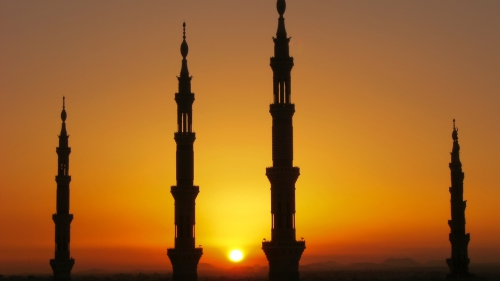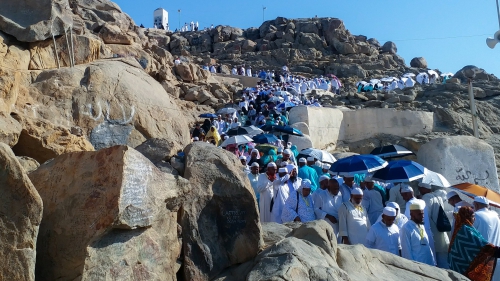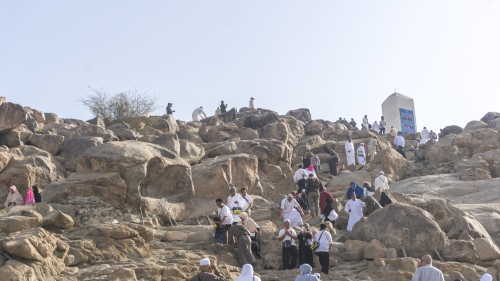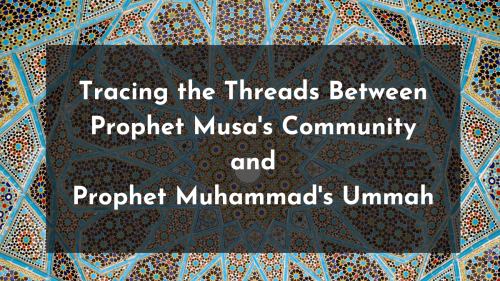Prophet Muhammad's (PBUH) Activities After Sunset
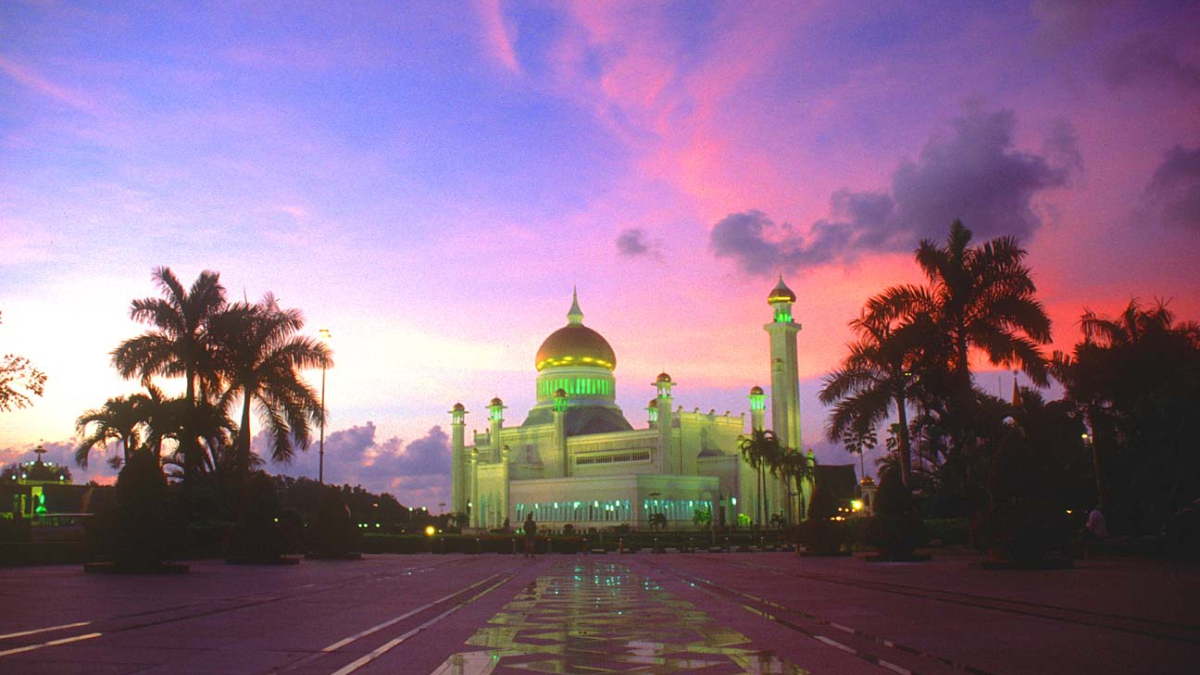
When the call is made for the sunset prayer, Maghrib, the Prophet tarries little before heading for the mosque.
He enters to find some of his companions already engaged in voluntary prayer. This is something he encourages, saying:
"Offer two units of prayer before Maghrib. Offer two units of prayer before Maghrib.""
Though he repeats it twice, he makes sure to add:
"This is optional."
These two extra units of prayer are offered very quickly, since the time between the call for Maghrib and the commencement of prayer is very short.
When the Prophet arrives, congregational prayer commences. He always leads Maghrib at the earliest part of its time. There is still a good amount of light in the sky when the prayer is over. It is bright enough that a marksman would still be able to engage in target practice and make the bull's-eye.
The Prophet rarely prolongs this prayer. He reads brief passages from the Quran. On one occasion, he reads the long chapter al-A`raf, and on another he reads al-Tur, but such occasions are rare. (The very last prayer he will ever lead his companions in will be the Maghrib prayer. On that occasion, he will read al-Mursalat.)
Prophet Muhammad does not sit and speak after Maghrib like he does after the other prayers. He knows that people want to get home and have dinner.
Prophet Muhammad returns home and offers two further units of prayer, which are the Sunnah prayers for Maghrib. Then he eats his meal. This is the usual time for dinner. Sometimes, if he is fasting, he takes this meal before Maghrib prayer. This is why he says:
"If dinner is served, then start with it before praying Maghrib. Do not be too hasty in eating dinner." Prophet Muhammad encourages his companions to invite the poor to share dinner with them. He likes to say:
"Whoever has enough food for two people should bring a third. Whoever has enough food for four people should bring a fifth." (At-Tirmidhi)
Sometimes, when the Prophet has a good amount of food at his home, he might invite ten people to eat with him. At other times, he has nothing at home but dates and water. Then there are times when days go by and there is nothing at all for him to eat. There is one evening when a man approaches the Prophet exhausted and emaciated, with signs of starvation written into the lines of his face. He says:
"O Messenger of Allah. I have fallen upon difficulties." The Prophet immediately sends the servant to the home of one of his wives to ask if there is any food to serve this distraught guest. She replies to the Prophet:
"I swear by Him who sent you in truth, I have nothing but water."
He sends the servant to another of his wives' homes, but she says the same thing. He receives the same answer from each of his wives in turn. So the Prophet appeals to his companions:
"Who will be this person's host today and receive Allah's mercy?"
Abu Talhah speaks up and says "I will" and takes the man to his home.
The Prophet's Eating Manners
The Prophet eats his meals on a large mat that he spreads on the floor. He never eats off a raised table. When the food is served, he invokes Allah's name and starts with what is immediately in front of him. He does not reach over to other parts of the mat. He eats with three fingers and instructs his followers to eat from the edge of the platter and leave the middle area, where the food is heaped, until the end of the meal. He says:
"This is where the blessings are."
The Prophet does not make an issue out of his food. He eats whatever is ready at hand. He asks his family:
"Do you have anything for me to eat?"
They might reply that they have nothing. They might say that they have only vinegar to serve with bread, to which he will reply:
"What an excellent condiment vinegar is." (At-Tirmidhi)
Prophet Muhammad never criticizes food. If he finds it palatable, he will eat it. Otherwise, he just leaves it alone. When he eats in the company of his companions, he always engages in friendly conversation. Occasionally, he speaks about more serious things, like etiquettes or religious knowledge, like the time he instructs Umar ibn abi Salamah on table manners. Umar ibn abi Salamah is the son of the Prophet's wife Umm Salamah from a previous marriage. He is being raised in the Prophet's household. Once when they are eating together, the child starts reaching all over the platter snatching up pieces of meat. The Prophet says to him:
"O child, start with Allah's name, eat with your right hand, and eat from what is immediately in front of you." (Al-Bukhari)
Later on in life, Umar will recall this incident and say:
"I have followed these table manners ever since."
Once, the Prophet was sitting with his companions when they were served a dish of lamb on a bed of gravy-soaked bread. He was given from the shoulder, which is his favorite cut of meat. He takes a bite from it. Afterwards, he says:
"I shall be the leader of humanity on the Day of Resurrection. Do you know why? Allah will gather the entire human race, the first of them to the last of them, on one great flat plain. A summoning voice will be heard by everyone and they will all be exposed to plain sight and the sun will come near. Its heat will be unbearable. In desperation, some people will say to the others:
"Don't you see the state you are in? Don't you see what has overtaken you? Why don't you find someone to intercede for you with your Lord?" Some of them will say: "Go to Adam..."
The Prophet then describes to his companions how the people will go to the various Prophets in turn, and all of them will decline to intercede for the people, until they approach him, and Allah will permit him to intercede on behalf of all humankind. Whenever the Prophet finishes eating, he licks his fingers. He encourages his companions to make sure that all of the last remnants of food on the plate are sopped up and eaten, saying:
"You do not know in which part of your food the blessings lie."
When the tablecloth is lifted off the floor, he says:
"Praise be to Allah, a bounteous, good and blessed praise.
Praise be to Allah who has sustained and refreshed us. It cannot be compensated for, nor can it be shown proper gratitude, nor can it be left aside, nor can it be done without.
Our Lord! You have fed us and given us drink. You have enriched us, fulfilled us, guided us, and sustained our lives. O Allah, yours is the praise for each and every thing that You provide."
He washes his mouth after eating food. He also does so whenever he drinks milk. After dinner, he drinks nabidh, a local non-alcoholic beverage made from fruit that has been left soaking in water since morning. He also drinks this beverage after lunch, for which it is prepared from the night before. When he takes dinner with one of his wives, he is warm and sociable while eating. He teaches:
"Even the morsel of food that you place in your wife's mouth is a form of charity." Aisha tells us something of the playful manner in which she would take dinner with the Prophet, saying:
"Allah's Messenger used to call me to eat with him. He would take a bone which had some meat on it and swear that I will have some of it. Then I would take a bite and put it aside. Then he would pick it up and place his mouth at the very place I had just taken a bite. He would call for something to drink and swear that I will have some before he drinks anything. I would then take it and drink from it then put it down. He would then take it up and drink from it, placing his mouth on the very point of the cup where I had taken a sip."
We can see from this the way Prophet Muhammad shows his wife how much he loves her. He turns the simple act of having dinner together into an expression of love and emotional sustenance for their marital life.
*****
Source: On Islam
Topics: Eating, Food, Prayers (Salah), Prophet Muhammad (S)
Views: 19216
Related Suggestions
His Praises morning and evening.He it is Who send His Blessings on
you and His Angels too that He may bring you out of
darkness(disbelief) into light (Belief) and He is Ever Merciful to
the believers.Their greeting on the Day they shall meet Him will be
Salam (Peace) And He has prepared for them generous reward.O Prophet
Verily We have sent you as witness and bearer of glad tidings and a
Warner,and as one who invites to Allah by His Leave and as a lamp
spreading light.And announce to the believers the glad tidings,that
they will have from ALLAH great bounty and obey not the disbelievers
and hypocrites and put your trust in Allah and Sufficient is Allah
as a Wakil (Trustee or Disposer of affairs). Ya Rabbil Salli
Wasallim Daiman Abada ala Habibika Khairul Khalq kulli himi.







